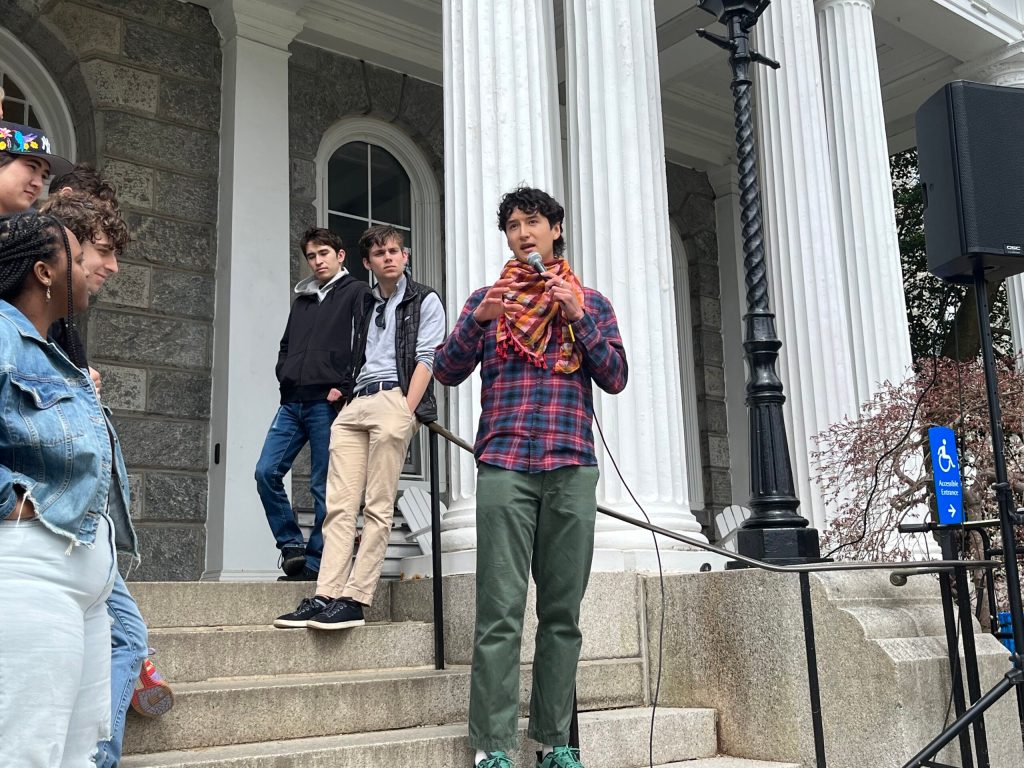“Come gather ‘round people, wherever you roam/and admit that the waters around you have grown/and accept it or soon you’ll be drenched to the bone/for the times they are a-changin’.”
With the rainy days we’ve had on Wednesday and Thursday, Bob Dylan’s words may ring especially true on campus. In another sense he is correct though — the times, they have a-changed and the times they will continue to change. The Swarthmore of today is very different from the one that existed in 1922, but one continuity has remained: our honors program.
The honors program was brought to Swarthmore by President Frank Aydelotte, namesake of the Aydelotte Foundation. He had been a Rhodes Scholar at Oxford University and believed there to be strong merit in the small seminars and intense nature of the work undertaken by students there. This fit into a larger project of his, namely making Swarthmore a more prestigious and rigorous intellectual campus. He and successive presidents would fight against the stereotype of Swarthmore as a country club for rich kids to party and have a good time. When he began his tenure in office, sports were controlled by the alumni and football was huge. Aydelotte eventually reduced the importance of football and brought athletics under the purview of the college. He also reduced the number of fraternity dances, supported the disbandment of the sororities, and worked to eliminate fraternity hazing. Aydelotte also worked to hire faculty who were experts in their field, reduce student-to-faculty ratios, and make admissions more competitive. Despite being Swarthmore’s first non-Quaker president, old Frank wanted Swarthmore to stay true to its Quaker roots and remain silent, diligent, and boring.
The honors program saw 40 students enroll in its first year, with juniors being given the choice to study either English literature or social sciences. Much of the idea behind honors seminars was that they were held in professor’s houses as a way to build closeness between professors and students and encourage a more congenial atmosphere. Professors didn’t stand at the front of the room lecturing, but rather sat together with students as peers, sharing ideas and contributing to, rather than leading the discussion.
This tradition was gradually left behind in favor of meeting on campus. This is likely reflective of a myriad of reasons. More professors likely lived away from campus as Swarthmore became more expensive, cars became more ubiquitous, and the railway became more reliable. Additionally, most professors were men, and they would typically have their wives cook dinner for the seminar. That too would change as Swarthmore’s faculty diversified and women took on more roles outside the home. A general trend towards professionalizing student-faculty relationships in the aftermath of many regrettable incidents on many college campuses also led to Swarthmore’s administration preferring that classes stay on campus.
One legacy of the seminar system was seminar dinners, a tradition of holding either the last seminar or meeting after the last seminar at the professor’s house over dinner. This was largely killed off by COVID-19, and another aspect of the honors program drifted into forgotten memory. Because students are only at the college for four years, older traditions are bound to be forgotten as newer classes are not as ingrained in certain vanishing elements of campus culture. The seminar dinner, much like the seminar at a professor’s house, is likely to go the way of the dinosaur.
While I understand and mostly agree with the decision to move classes away from professors’ houses, I will express regret over the fact that Swarthmore’s honors program does not feel truly special in the way it would have historically felt. I applaud the honors program for hosting an honors reception each semester, but I still wish that there was more to build community within the honors program. I’m not proposing honors dorms like some colleges have, but rather asking that the college organize and facilitate more events for honors students. Given the intense workload of all students at Swarthmore, including honors students, extra-curricular events with strangers are often the best or only way to meet new people.
Swarthmore has the oldest honors programs in the United States and, in many ways, it reflects that by elevating and exalting the honors program. Honors provide a unique experience to engage in a mode of learning that is increasingly left behind in favor of large lectures, asynchronous classrooms, and the many other aspects of a changing education system. I hope that the honors program can reclaim some of its former mystique and glory and that it remains an essential part of Swarthmore’s campus in the coming decades. I leave you with the words of Frank Aydelotte on the honors program.
“We never had at Swarthmore to contend with the handicap of that type of academic conservatism which refuses open-minded consideration of new proposals merely because they are new, and refuses change because it is change.

















This is genuinely regrettable, and frankly, wrong. Some of the most profound educational experiences of my life occurred sitting in Phillip Weinstein’s living room in an English Literature seminar. That experience, the close, rigorous, personal work is, or should be, the entire point of an undergraduate education. That work is why everyone’s at Swarthmore. Not protesting political abstractions, not identity politics, but working with the best faculty in the world, side-by-side. That is what makes Swarthmore unique, and the education students receive priceless.
Students should be protesting this. The essence of their education is being dismantled, for reasons the college could easily overcome if it wanted to.